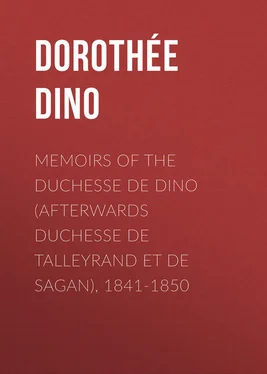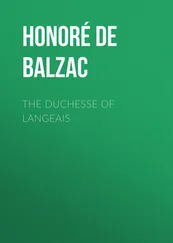Dino Dorothée - Memoirs of the Duchesse De Dino (Afterwards Duchesse de Talleyrand et de Sagan), 1841-1850
Здесь есть возможность читать онлайн «Dino Dorothée - Memoirs of the Duchesse De Dino (Afterwards Duchesse de Talleyrand et de Sagan), 1841-1850» — ознакомительный отрывок электронной книги совершенно бесплатно, а после прочтения отрывка купить полную версию. В некоторых случаях можно слушать аудио, скачать через торрент в формате fb2 и присутствует краткое содержание. Жанр: foreign_antique, foreign_prose, на английском языке. Описание произведения, (предисловие) а так же отзывы посетителей доступны на портале библиотеки ЛибКат.
- Название:Memoirs of the Duchesse De Dino (Afterwards Duchesse de Talleyrand et de Sagan), 1841-1850
- Автор:
- Жанр:
- Год:неизвестен
- ISBN:нет данных
- Рейтинг книги:4 / 5. Голосов: 1
-
Избранное:Добавить в избранное
- Отзывы:
-
Ваша оценка:
- 80
- 1
- 2
- 3
- 4
- 5
Memoirs of the Duchesse De Dino (Afterwards Duchesse de Talleyrand et de Sagan), 1841-1850: краткое содержание, описание и аннотация
Предлагаем к чтению аннотацию, описание, краткое содержание или предисловие (зависит от того, что написал сам автор книги «Memoirs of the Duchesse De Dino (Afterwards Duchesse de Talleyrand et de Sagan), 1841-1850»). Если вы не нашли необходимую информацию о книге — напишите в комментариях, мы постараемся отыскать её.
Memoirs of the Duchesse De Dino (Afterwards Duchesse de Talleyrand et de Sagan), 1841-1850 — читать онлайн ознакомительный отрывок
Ниже представлен текст книги, разбитый по страницам. Система сохранения места последней прочитанной страницы, позволяет с удобством читать онлайн бесплатно книгу «Memoirs of the Duchesse De Dino (Afterwards Duchesse de Talleyrand et de Sagan), 1841-1850», без необходимости каждый раз заново искать на чём Вы остановились. Поставьте закладку, и сможете в любой момент перейти на страницу, на которой закончили чтение.
Интервал:
Закладка:
"Our dear aunt, Miss Fox, of whom we are very fond, since she has been a real mother to my husband, has given us much anxiety. She has been very ill, but I hope that she is out of danger; she regrets her brother whom she loved for himself alone. There is no sense of vanity, no regret for loss of position, and no ambition in her grief, while everything that she has seen or heard since his death has shocked and pained her. We have also been alarmed for my poor cousin, Lady Melbourne; an illness after a miscarriage was nearly the death of her, but I now hope and trust that she is out of danger; these, however, are incidents which hurt and leave their marks. She thought she was dying and left all that she loved with calmness, submission and tenderness, forgetting nothing that could conduce to the happiness of her husband whom she was leaving.
"We spent a week at the beginning of the year at Windsor; it was a picture of perfect happiness; our dear little Queen, handsome Prince Albert and the little Princess, a pretty and good-tempered child, ready to do anything with a smile, a certain sign of good health. The Queen is said to be with child again. We were dining there four or five days ago and the Queen seemed to me to be not quite well, though she danced a good deal two evenings later, but in any case she is so strong that one cannot judge by appearances."
Rochecotte, March 1, 1841. – My last month of Rochecotte is now beginning, much to my regret. I have been as well here as I can be at present. I live free from fatigue, agitation, trouble and constraint; all these I shall find at Paris, but there would be a certain affectation if I stayed away altogether; and before starting for Germany I have a number of little things to do and some preparations to make which can only be done at Paris, so I have resolved, though with much reluctance, to start in April.
Yesterday I had a letter from Madame Mollien, which seems to me amusing from beginning to end: "I must say a word to you of this fancy dress ball, a carnival ball which will form an epoch in the annals of the Tuileries, because for some hours it has brought back to its walls, which are usually so sad, the frank, simple and unrestrained cheerfulness which can only be seen in the simplest salons. The success of the entertainment was due to the Prince de Joinville; no one could withstand his impetuosity. The costumes were varied, generally rich and tasteful with a few exceptions; there are exceptions everywhere. The Queen, the old Princesses and the old ladies who were not wearing costumes went in succession to the gallery of Louis-Philippe. All in costume, ladies and gentlemen, met in another part of the château and made a solemn entry about half-past eight to the sound of an appalling band, composed of all kinds of more or less barbarous instruments which the Prince de Joinville has collected in his travels. He himself, in true Turkish costume, carried an enormous drum of a most oriental kind, on which he made a tremendous noise. A magician preceded the procession as a herald, and the company was conducted by the Duchesse d'Orléans. She was splendid with a dignified air: her costume was that of Marie of Burgundy, black velvet richly embroidered with gold and trimmed with ermine; the tall pointed cap which forms part of this costume was ornamented at the front with a velvet bow embroidered with enormous stones; the cap itself was of cloth of gold surmounted by a veil of tulle embroidered with gold. Two ladies and two gentlemen, alike in costumes of the age of Louis IX., escorted the Princess. The two ladies, whose costumes were like hers though not so rich, were Mdmes. de Chanaleilles and Olivia de Chabot; the men were M. Asseline, her Secretary of private commands, and M. de Praslin, who looked very well in a long cloak of brown velvet and marten fur, and called himself Philippe de Commines. Poor Princess Clémentine was not a success: she wore a Turkish costume which the Prince de Joinville had brought back from Syria; it was handsome but heavy and ungraceful, and her supple and charming figure was not shown off until after supper when she took off the enormous headdress which was crushing her, to be able to dance more at her ease. The Duchesse de Nemours, on the other hand, was charming: she had copied a portrait of the wife of the Regent, whom she is supposed to resemble. The outer dress was of red velvet, very short, with a skirt standing out and trimmed with rubies and diamonds all round, upon a skirt of white satin trimmed with two rows of broad green fringe and garlands of pearls; a small velvet cap with one little feather standing upright was put on the side of her head and touched her forehead, leaving her head almost bare upon one side. Her very fair hair slightly powdered, curled, fluffy, turned up on one side and falling down on the other, gave her a coquettish appearance and an apparent want of care which was charming. I have never seen her so pretty, and so every one said. The others are not worth mentioning. At the same time there were some pretty dresses, including ladies of the time of the Ligue, of the Fronde, of Louis XIII., of Louis XIV., some Spanish costumes, and also a vivandière of the time of Louis XV., which caused quite a sensation. Madame de Montalivet and Madame de Praslin each appeared as Mlle. de Hautfort, in rivalry. Many of the ladies were powdered. The Duc d'Orléans did not return from Saint Omer as he had said he might do, to the great vexation of the Princesse; I think his absence rather spoilt her evening. The Prince de Joinville speedily rid himself of his Turkish costume; his two young brothers first appeared in military costumes of the last century. After the first dance they all three went away and soon came back again; the Prince de Joinville and the Duc d'Aumale as débardeurs and the Duc de Montpensier as a fifi of the time of the Regency. If you happen to have a neighbour who is accustomed to go to fancy dress balls (I do not think M. de Castellane is), you can ask him for explanations of these costumes. Their chief merit and probably the reason for their choice, is that they are an excellent support in themselves to revelry, as they authorise and even require a cheerful manner. The quadrilles were formed only in two rows; as there was plenty of room they were able to stand without crowding. As the couples at each end would have had too much space to traverse, each figure was repeated only twice instead of four times, and thus without rest or relaxation, ever in movement, each dance finished by a general galop to music played in much quicker time for that purpose. This went on till half-past three in the morning with a vivacity which I could hardly believe possible. The Queen was greatly amused, and the King himself seemed to find some pleasure in all this gaiety. He stayed till supper, which was served in the Galerie de Diane at little round tables, as at small balls. The Infants and Infantas of Spain were all in costume, excepting their father and their mother. She only danced the English dance, which concluded the ball. Her partner was an Incroyable of the Revolution, and they looked sufficiently incredible. However, she excused herself from the last galop which ended this dance and was more uproarious than all the rest. The Prince de Joinville had the Duc de Nemours as his page, and he took a very cheerful part in all these gaieties throughout the evening. He made some attempt to imitate his brother, but the Prince de Joinville with his wild spirits coupled with his grave and handsome face, his alertness and originality, was in every respect inimitable. I have forgotten to mention M. and Madame de Chabannes: she appeared as a lady from the Court of Charles IX.; her costume, which was said to be designed by Paul Delaroche, was exactly correct, and made her absolutely hideous. He was wrapped from head to foot in those waves of white muslin in which the Arabs are dressed; this was not an imitation, for the whole thing came from Algiers – the costume, the dagger, the pistol, and also an enormous gun which he had captured at Blidah or at Milianah. He was on duty, and in this costume he preceded the King and Queen when they came from their apartments to the ballroom. In my opinion he showed not the least proof of courage in this campaign.
Читать дальшеИнтервал:
Закладка:
Похожие книги на «Memoirs of the Duchesse De Dino (Afterwards Duchesse de Talleyrand et de Sagan), 1841-1850»
Представляем Вашему вниманию похожие книги на «Memoirs of the Duchesse De Dino (Afterwards Duchesse de Talleyrand et de Sagan), 1841-1850» списком для выбора. Мы отобрали схожую по названию и смыслу литературу в надежде предоставить читателям больше вариантов отыскать новые, интересные, ещё непрочитанные произведения.
Обсуждение, отзывы о книге «Memoirs of the Duchesse De Dino (Afterwards Duchesse de Talleyrand et de Sagan), 1841-1850» и просто собственные мнения читателей. Оставьте ваши комментарии, напишите, что Вы думаете о произведении, его смысле или главных героях. Укажите что конкретно понравилось, а что нет, и почему Вы так считаете.












